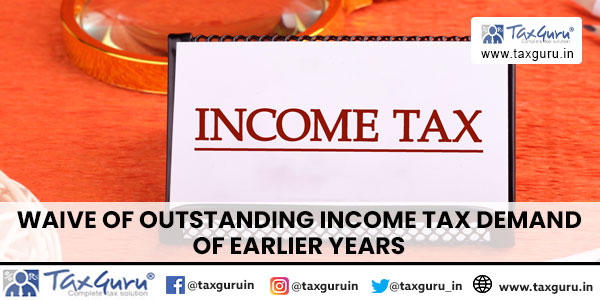During Interim Budget 2024, Finance Minister Smt. Nirmla Sitharaman has announce, the waiving off old outstanding tax demands for a specified amount up to specified financial years, with specific terms and conditions. This is for the first time in history of our country. The intention of this relief is, to give some benefit to smaller tax payers and records of many years can be destroyed.
The Central Board of Direct Taxes (CBDT) issued a circular on 13th February, 2024, to implement the interim budget announcement of waiving off direct outstanding tax demand of up to specified amounts for specified financial years.
In the interim budget Finance Minister Smt. Nirmala Sitharaman had announced the waiver of outstanding personal tax demand up to Rs. 25,000 till financial year 2014-15. According to the announcement, all the outstanding personal tax demands up to Rs. 25,000 till financial year 2009-20 and up to Rs. 10,000 for financial years 2010-11 to 2014-15 will be withdrawn by the government.
Before this announcement of waiving of outstanding demand, many times this kind of announcements were made. Between the years 1951 to 1997, ten types of waiver scheme were announced. The scheme known as Voluntary Disclosure of Income Scheme – 1997, (VDIS) was announce in the year 1997, which was responded by the tax payers. Under this scheme Company and Firm assesses can pay tax @ 35% on disclose income and enjoy 65% income. The same way other than firm and company assesses can pay tax @ 30% on disclose income credit reaming income in their books.
Thereafter when Shri Arun Jetly, was finance minister, he introduced scheme known as Income Discloser Scheme (IDS).Under this scheme assesse can disclose any amount and pay tax on that income 30% as income tax and 7.5% as surcharge, which was declare as Krushi Kalyan Surcharge, plus 7.5% as penalty. It means an assesse has disclose any amount, on which he has to pay tax @ 45%.
The circular issued on 13th February, 2024 has clarified that extinguishment of outstanding tax demand from a taxpayer does not give him/her he right to claim tax refund of any amount under the Income Tax Act, Wealth Tax act and Gift Tax Act. However, what if your income tax refund is struck due to litigation?
Usually, old outstanding demands are adjusted against the income tax refunds of the subsequent years. So when you file an income tax return and there is a tax refund due, the department would adjust that refund against the old outstanding demand. That means, if any refund has been already adjusted against these demands, then that refund will not be issued again. For example, assesse had a demand of Rs. 15,000 for assessment year 2006-07 and he had a refund of Rs. 10,000 for assessment year 2021-22. The demand for assessment year 2006-07 would be adjusted against the refund of assessment year 2021-22. The balance demand of Rs. 5,000 will be waived off by the department and nothing can be done with the adjusted refund.

Maximum amount of waiver Rs. 1,00,000
Up to assessment year 2010-11, amount of waiver is Rs. 25,000 while from assessment year 2011-12 to assessment year 2015-16 is Rs. 1,00,000. Hers the board clarify that maximum relief will be of Rs. 1,00,000. To understand this take following example.
| Year | Assessment Amount
(Rupees) |
Liable for Waiver | Amount for Waiver
(Rupees) |
Reason for Not Waiver |
| 2004-05 | 24,000 | YES | 24,000 | – |
| 2005-06 | 22,000 | YES | 46,000 | – |
| 2008-09 | 28,000 | NO | 46,000 | Amount of tax more than 25,000 |
| 2009-10 | 23,000 | YES | 69,000 | – |
| 2010-11 | 25,000 | YES | 94,000 | – |
| 2011-12 | 15,000 | NO | 94,000 | Amount of tax is more than 1,00,000 |
| 2012-13 | 10,000 | NO | 94,000 | – do – |
From the above example we find that for assessment year demand is more than Rs. 25,000 so waiver is not applicable, while for assessment year 2011-12 demand is of Rs.13,000 but total amount of waiver will become more than Rs. 1,00,000, therefore no waiver is possible.
It is advisable that before going to take benefit of this scheme, one should calculate the outstanding demand year wise.





